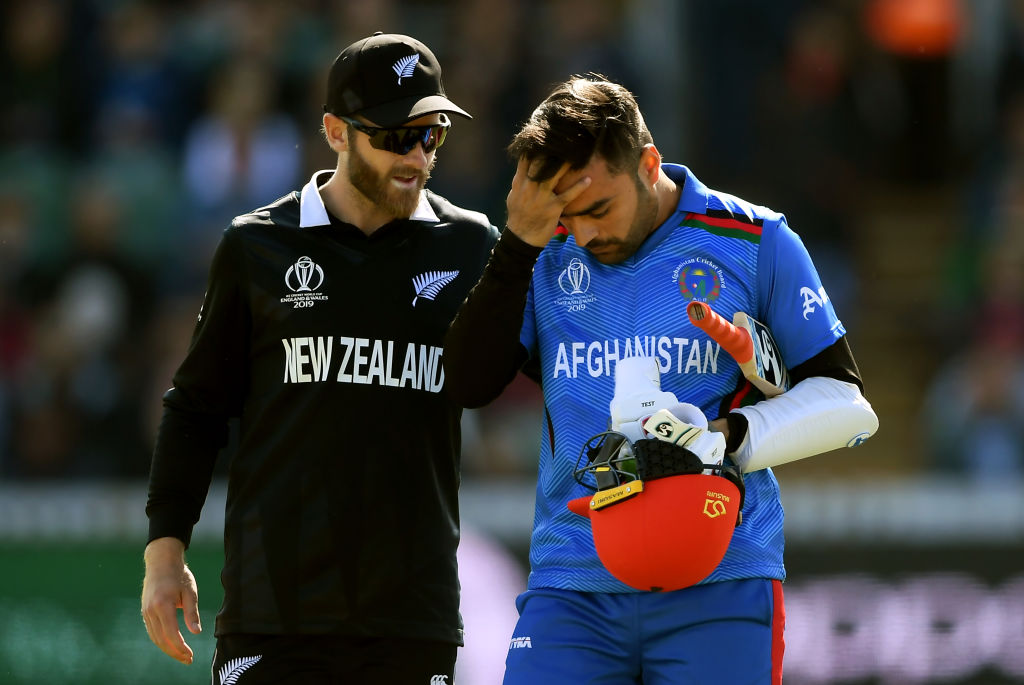AFG vs NZ | Takeaways - Afghanistan’s biggest problem and ICC's passive approach to concussion

Getty Images
New Zealand continued their winning streak in the World Cup - notching up a hat-trick of wins - against an Afghanistan side that lost Rashid Khan for the second innings. While the game highlighted the Kiwi’s strengths, another Afghan defeat showcased the real problem as a painfully obvious one.
Afghanistan’s partnership problem
As heartwarming as the Afghanistan cricket story is, they are now in the big leagues and the feel-good factor means nothing. In 68 ODI matches since the last World Cup, Afghanistan have been able to get a century stand just 14 times. Forget India and England, Bangladesh, who have played 66 matches in the same period, have been able to do it 32 times, with three of these being double century stands, whilst playing a better class of teams. While Bangladesh might have a better group of batsmen at their disposal, the Afghans are not as bad as the numbers suggest.
Afghanistan usually start off with two power-hitters at the top of the order with Rahmat Shah and Hashmatullah Shahidi. Out of the 14 aforementioned century stands, the former was a part of eight of them but he has looked out of sorts so far. And so has Shahidi who, despite his half-century today, has averaged a mere 33.87 this year - 24.96 lower than 2018. The duo have to realize that if Afghanistan have any hope of playing out the entire innings in the coming matches, they have to step up and guide the team through the middle overs, even if that comes at a cost of some runs.
Rashid Khan injury should be an eye-opener for World Cricket
A batsman stands 22 yards from a man who can fling a round object, weighing 155.9 g, at 150kmph right at their head. If the bowler gets close to the helmet, everyone - right from the commentators to the fans - applaud him for aggressive bowling. All one needs to do is go back a couple of years to realize how big a problem concussion is in cricket. As many as three players, Ahmed Shehzad, Mushfiqur Rahim and Sadeera Samarawickrama, played on in an international match despite suffering from concussion. Let me clarify - This is not a rant on how bouncers should be reduced.
With cricket finally catching on with other major sports in highlighting the problems of concussion, enough still hasn’t been done for the game. Australia have already introduced concussion substitutes in their domestic competitions so as not to ruin the chances for a team while ensuring the safety of players. Today, when Rashid was ruled out of the game, any chance Afghanistan had of making the game competitive went away with him. Aaron Finch made the same point a couple of days ago and it is high time, the ICC addresses the problem, if not for the players then they can certainly do it for the fans and the sport.
Is it time to look at New Zealand as a true contender?
If any team was sitting at the top of the table with three wins in as many matches and an NRR of +2.163, they would be seen as contenders for the title. But not for New Zealand. After all, who have they played so far? Bangladesh? A Sri Lanka in transition? The mighty Afghanistan? And even then Bangladesh pushed them to the absolute limit and had Mushfiqur Rahim not had his brain-fade moment, we might not have been here. But as things stand we are and there is more to this run than just piling on the misery on the minnows.
The Kiwis already have a middle order that even India might envy and allied with their pace attack, they become a huge threat. With three fast bowlers and two medium pacers, they can exploit as much as possible on a wicket that affords them the luxury. If not, they have the ever-reliable Mitchell Santner with Ish Sodhi for a spinning track. Another three wins and they should be able to sneak into the semis. Once there, they have enough match winners from top to bottom to beat anyone. This could come back to bite me on the 13th when they play India, but from the looks of it, they are here to stay.
